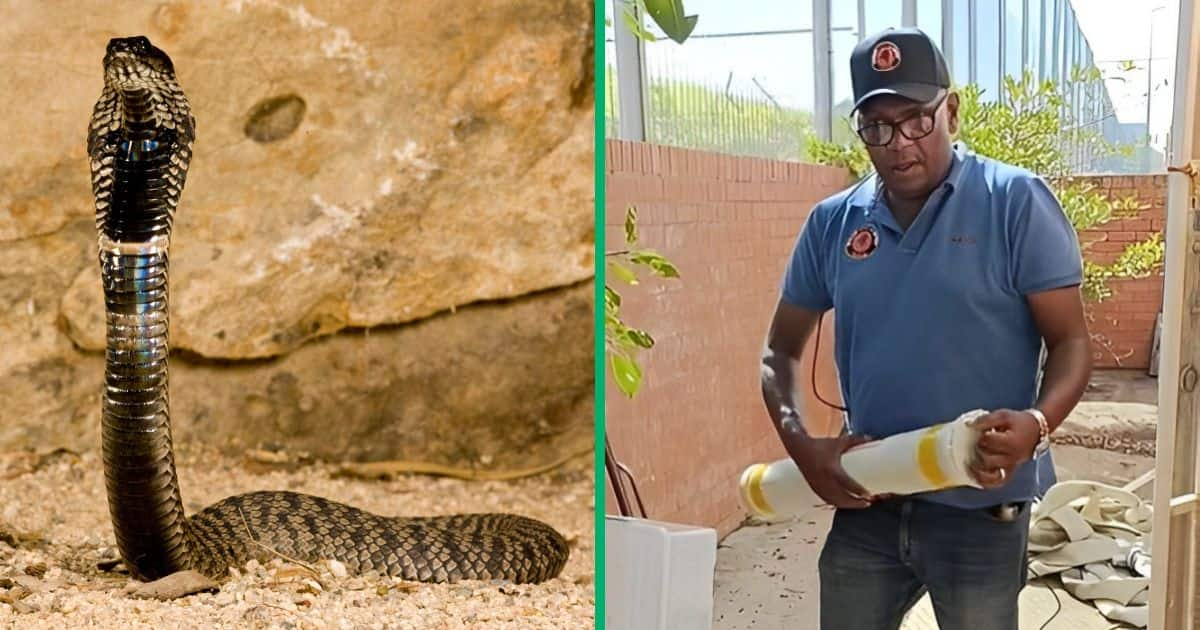
WATCH: VIRAL VIDEO SHOWS SNAKE CATCHER CAPTURING RINKHALS
- A snake catcher bravely caught a rinkhals that was hiding under a box in a pool pump room
- The Eastern Cape snake expert used a set of tongs, a hook and his bare hands to capture the snake
- People in the comment section applauded the snake catcher, while others shared that the video scared them
- A reptile expert provided Briefly News with information about the snake and what to should one get bitten
A snake catcher in the Eastern Cape frightened netizens when he caught a rinkhals.
SnakeRescue NSRR Eastern Cape shared footage of the safely captured snake to its TikTok account (@snakerescuekwt). The incident occurred at a Youth Centre in Bhisho.
The minute-long clip starts with the snake catcher looking for the snake hiding under a box in a pool pump room. After moving the box with his hook and tongs, the snake expert catches the highly venomous snake.
The man then removes the rinkhals from the pool pump room, letting it slither before he picks up the snake by its tail and uses his tools again to transport it safely to a bag designed for snakes.
Watch the video below:
Netizens react to captured rinkhals
Most people worldwide cringe at the sight of snakes, so it was no surprise when internet users in the comment section did the same.
A worried @givenmorowane said:
"I was shivering and praying that it doesn’t bite you."
Stating that the snake encounter was scary, @akon8568 asked:
"What do you do with them after saving them?"
SnakeRescue NSRR Eastern Cape replied:
"We release them in a safer environment far away from people as possible."
@akon8568 then shared:
"Very brave. I'm scared of snakes, even when they are on the TV."
@kampioen.viljoen applauded the snake catcher in the viral video:
"Good job!"
Animal lover shares details about the rinkhals
Jason Arnold, who has a special interest in reptiles, particularly snakes, explained that rinkhals are elapids, a group of snakes with fixed-front fangs that include mambas and cobras.
"A rinkhals raises up and spreads a 'hood' just like our cobras do. It can also spit or spray its venom like a few of the cobra species. It is, however, not a cobra. This is because true cobras have flat, smooth scales and reproduce by laying eggs. Rinkhals have ridged or 'keeled' scales, and they produce live young."
While rinkhals are highly venomous, they are considerably less venomous than mambas and cobras.
Jason, who runs a professional snake removal service in Durban, also explained what one should do if a rinkals bites you:
"The patient must be kept calm and transported to the nearest competent medical facility without delay. The patient must be kept as still as possible not to speed up the spread of venom. This will help to delay the onset of symptoms."
He adds:
"For treatment of venom in the eyes, flush the eyes with gentle running water for a good few minutes and then seek medical treatment for further treatment. You should also wash the entire face to get rid of any residual venom on the skin, which could otherwise be transported into the eye/s with sweat or water droplets on the skin."
Snake handler risks life to save family from Cape Cobra
In a related article, Briefly News reported in April about a professional snake handler who saved a family from a Cape Cobra lurking in their kitchen cabinet.
The gent skillfully manoeuvred his tool and hand to extract the venomous snake from the cabinet's tight confines. He fearlessly reached out and grabbed the cobra with his bare hands, leaving viewers on the edge of their seats.
2024-05-30T08:04:00Z dg43tfdfdgfd